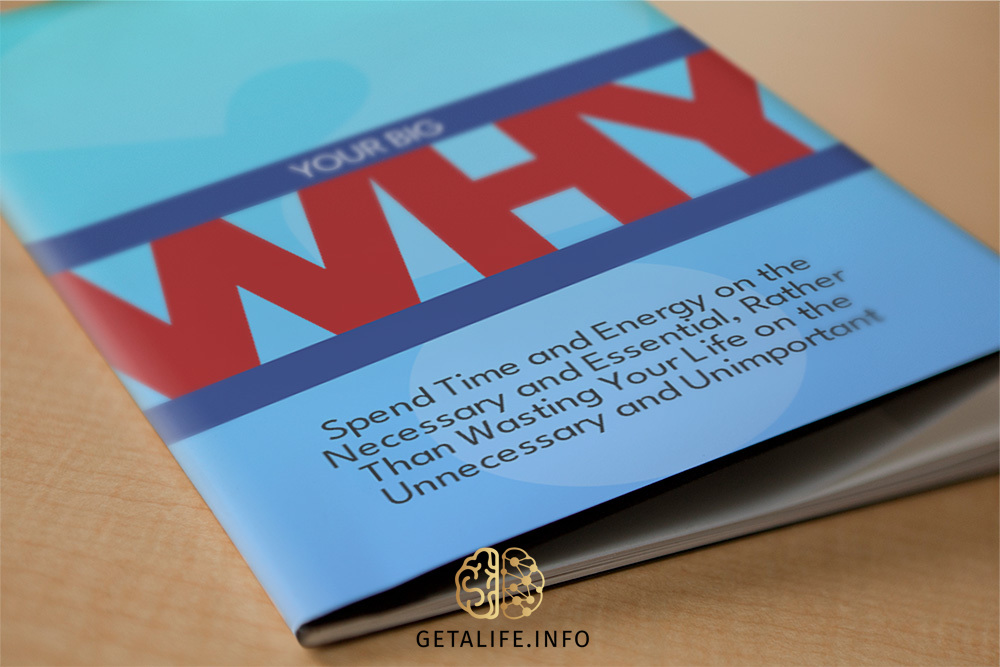Get Your Priorities Right

Why Do We Repeatedly Do the Unnecessary?
It’s your day off from work, and you’re determined to accomplish a lot. You pull out your handy notepad and start jotting things down.
An early start to the day means you can probably get a lot done. You look at your work list. It all seems doable. You head to the kitchen to make some coffee and start cleaning when you get a text message. It’s a good friend, someone you chat with several times a week.
You decide that since you got up so early, it won’t hurt to enjoy a short conversation. You plop down on the sofa, grab the remote and turn on your television, out of force of habit more than anything else. Over two hours later, you’re still there. The text conversation is long gone, but the familiar feel of your smartphone in your hand led to you cruising the web while halfheartedly watching television for the last couple of hours.
You remember how motivated you were earlier to handle some necessary tasks. But lounging around on your sofa while letting your TV and phone drain your brain means you have very little energy to do much of anything. You rationalize that it’s your day off, and it’s still early. So you shut off the telephone and lie down on your sofa for a little nap.
When you awake later, your stomach is rumbling. You never ate breakfast. It’s almost lunchtime now. Though you have plenty of food in your refrigerator and pantry, you decide to treat yourself to lunch at your favorite diner. You spot some friends there, and that’s the beginning of the end of your planned productivity.
Why Do We Spend so Much Time on Unnecessary, Unproductive, and Time-Killing Activities?
What happened? You had such good intentions. You were so fired up and ready to be productive. It’s not like you didn’t want to do those things. You were looking forward to tackling those tasks. So why are you heading to bed with absolutely none of them accomplished? And more importantly, why does this happen so frequently?
If this is all too common. It happens to all of us. The way human beings are hardwired makes us unconsciously embrace a mindset that says, “If it isn’t broken, don’t fix it.”
Cleaning your kitchen and tending to your yardwork takes action and energy. Living life as a couch potato doesn’t. So your subconscious tells you, “It’s your day off. Chill out. Everything’s fine in your life so let’s not go risking a good thing. You’re already on your sofa so why not stay here?”
There is an ancient survival instinct at work here. As long as you’re alive and have shelter, food, water, and safety, the survival mechanism you inherited from your cave-dwelling ancestors is happy.
It becomes a concern when you try to change just about anything that isn’t happening now. Even if the changes you’re trying to make will deliver a positive result, you can’t convince the Neanderthal inside you that good enough isn’t good enough.
This is one big reason why we spend time on unnecessary activities. We know we need to be doing necessary, essential things. There are so many different areas of our lives that we desperately want to improve. We get motivated, we get the resources we need, and then we just don’t ever seem to get around to doing something about it.
What’s the Answer? Baby Steps and Repetition
Do something small. Find something that only takes a couple of minutes to finish. Jump on it and get it done. Then take a second to tell yourself, your subconscious, to look at the result. You’ve created a positive outcome. It’s better than what you had before. Seriously, have a one or two-sentence conversation and address your subconscious as if you were talking to a real person.
Then do something else small that doesn’t take much time to finish. Repeat this process. Eventually, start building up to things that require more time and effort. The only way to program your brain to work on necessary tasks and responsibilities is to turn conscious actions into unconscious habits. Over time you will eventually start avoiding unnecessary, time-wasting activities and getting more necessary things done.
What’s Your Right-Now Priority, the Thing That’s Necessary at This Present Moment?
How many things can you do at once? You can truly only do one thing at any given moment. Sure, you can work on three different tasks simultaneously. But each specific second of your action is only devoted to one of those three tasks.
We mention this to help you identify what’s necessary in your life.
You probably wouldn’t argue that if you only did necessary, essential, and important things, you could start living the life you’ve always dreamed of. Unfortunately, our days are filled with unnecessary and time-wasting activities. There are things each of us could stop doing daily that would give us more time to spend on the really important things.
Incidentally, that means you have to understand what’s important in the first place.
You might think you know what truly matters in your life. You might be right. For many of us, though, shortsighted vision, busy schedules, outside influences, and distractions lead us to an unclear and sometimes incorrect picture of what will bring us the most joy and satisfaction.
So much daily energy is spent on activities and with people that don’t reward us in some way or move us toward achieving an important goal. One way to spend more time on the important things is to ask yourself the following question.
What Is the Most Important Priority Right Now, at This Very Moment?
There might be a lot of things you could be doing. These are things that are going to need to be accomplished soon. We’re not talking about selecting all of them. If you have a list of five different tasks or activities, what is the all-important, necessary thing you need to do right now?
By the way, it might not be the sexiest thing in the world.
It could be a task you have to do rather than something you want to do. That doesn’t matter. To make the most efficient and effective use of your time, always ask yourself what you should be doing now.
This simple question can reveal the necessary things for a great life experience. It also shows you what tasks and activities you’ve been spending unnecessary time doing. You uncover the “necessary” of your life and also the unnecessary.
If you find that the most important thing to do right now is boring or unenjoyable, look at your life. Is there some way other people can handle this task for you? Could you perhaps revisit your important goals and find a way to remove this undesirable, mind-numbing activity from your schedule?
By asking yourself these questions, you can begin to design your life to pursue necessary actions and avoid unnecessary activities and habits. Your right-now actions become influenced by your values, beliefs, and goals. This leads to a quicker path to achieving the important things in life.
To Identify the Essential, Think “Priority” and Not “Priorities”
When Philo T. Farnsworth invented the television in 1927, the word “priorities” was virtually nonexistent. It was rarely used. That’s because people had fewer distractions. Ask anyone about their number one priority, and they could quickly tell you.
Televisions didn’t become common for quite some time after their invention. Television wouldn’t become a common household stable until the 1940s. Guess what? That’s about the same time the word priority was pluralized. It became common for people to mention their priorities rather than their priority.
Today televisions and computers, smartphones and tablets, and our constantly busy lives fight for our attention. We often let technology distract us before we have much chance to start our day.
Before we realize what we’re doing, we’ve turned on the television and scooped up our smartphone while waiting for the morning coffee to brew. We distract ourselves before we prioritize the day. And when we get around to deciding what we’re going to do, we talk about priorities, not our number one priority.
Focusing on Several Things at Once Isn’t Really Focusing
This is why many people don’t accomplish the big things they desire. They are running around doing multiple things simultaneously, never creating the lives they desperately want to live. Their daily focus is on so many different priorities that they get very little accomplished on any of them.
Imagine each day you decide on one big priority for the next 24 hours. There are still going to be other things you must do (go to work, run errands, pick up the kids from school, etc.), so you have to schedule them. But before you decide when and how to do those things, ask yourself what the biggest priority is for today. Then do the same thing for tomorrow, next week, next month, and next year.
Whip out your planner and start scribbling. Think of one big priority for short-term and long-term timeframes. Schedule it and make a plan of attack to accomplish it. What skills and resources are you going to need? Obtain them. What financial or time investment is required? Make a plan for getting the time and money you’ll need.
Don’t let your busy, hectic, and distracting world water down your focus. Work towards your biggest priority, not multiple priorities.
You’ll start to see that you accomplish more meaningful things in your life, spending time on necessary activities. You’ll discover that many of your lesser priorities are unnecessary to worry about, at least right now.
Do this frequently, at least once a month. You’ll find that your big priority can change, especially after you achieve it. Then get busy doing whatever you need to make your biggest single priority a reality. You might be surprised that your biggest dreams quickly become realities since you’re only focusing on them one priority at a time.
Do This to Get Rid of Unnecessary Things
Imagine a perfect world where everything you owned was necessary. There’s a place for everything, and everything is in its place. You could be so incredibly productive. There wouldn’t be a wasted moment. Everything is absolutely necessary.
That might sound like a dream world. We all have so much distracting clutter and so many unnecessary possessions. Aside from distractions, clutter can be downright dangerous. You might create a trip-and-fall environment if you have too much “stuff” around everywhere. Storing tons of unnecessary paper products can mean a fire hazard.
You understand this. You might even be thinking that you don’t have excess anything. Your home is neat, and you can’t think of anything you have too much of. Even so, you can benefit from a simple practice that gets unnecessary clutter and possessions out of your life.
Perform a Regular Inventory Check
Have you ever bought something because you thought you needed it, only to discover later that you already had one? This is not uncommon. Some people own so many things that they can’t readily see what they already have.
This leads to unnecessary expense and time wasted traveling to and from a store to purchase the object. You can keep this from happening by looking at your home as a retail store.
Retail operations undergo frequent inventories. They don’t assume anything. The computer might say they have five of something, but they check anyway, performing monthly or quarterly stock checks. You can do the same.
The first inventory you perform might take some time. When you do this regularly, your time investment isn’t as substantial. You can keep a copy of your inventory list in cloud storage or as an email attachment, so you always have access to it.
Here’s something else you can do to eliminate useless expenditures and unwanted clutter.
Unsubscribe
Do you ever sign up for email subscriptions to restaurants and retail stores? Maybe there’s a website that offers clearance items at bargain prices. You score some really good savings there, so you sign up for notifications of new deals.
Unsubscribe from most or all of these distracting temptations.
They constantly scream at you from your inbox, leading to unnecessary purchases. Over time you can save some substantial money and cut down on the unnecessary things in your life that are taking up your attention and physical space.
These are a couple of ways to remove the unnecessary from your life. They allow you to devote more time, money, and energy to the truly necessary things, bring you great joy and reward you in other ways. Start practicing them today for a more fulfilling and stress-free tomorrow.
3 Simple but Powerful Ways to Cut Back on Unnecessary Spending
Even the most miserly penny pincher can waste money from time to time. We all do, don’t we? Human beings are so good at rationalizing unnecessary and impulsive purchases. That’s why stores will place low-cost accessories, snacks, and magazines right by the cash register.
They know that more than a few of us won’t be able to ignore the siren song of some gossip rag that promises to show us irrefutable evidence that Bigfoot is real. Do you want to read an interview of the two hunters that captured one alive? Yes, please!
While you’re at it, why not grab that soft drink and candy bar? They’re sitting right there, begging for your attention. Sure, you don’t need them, and they certainly fall outside your dietary constraints, but so what?
That example brings us to one of three easy ways to save money for necessary things by eliminating unnecessary purchases.
1. If It’s Not on the List, It Doesn’t Go in the Basket
This is simple. Make a list before you go shopping for groceries. Buy only what’s on your list, nothing more. This not only keeps you from making impulse buying decisions. It also saves you time and money because you won’t forget to buy something you need and have to make an unnecessary second trip.
One exception here is if you spot an incredibly good sale.
This doesn’t pertain to impulse items. If you don’t need 10 pounds of boneless chicken breast or you don’t have anywhere to store it, then its bargain price might not matter. On the other hand, if something you regularly purchase is at a price that’s too good to pass up but not on your list, it might make sense financially to go ahead and make the purchase.
2. Give Yourself Zero Spending Days
This is just what it sounds like. You promise you won’t spend any money on four or six or 10 days every month. Emergencies obviously don’t count. Other than that, you don’t buy anything at all. This includes potential purchases large and small.
3. Use What You Have, Rather Than What You Want
You’d really like to go out for dinner, but you have plenty of food at home. There’s a new car you’ve had your eyes on, but yours is perfectly fine, and you’ve kept it in great shape. Sometimes we “want” to do something but don’t “need” to do it. Every day you get by with what you have. Rather than purchasing something you don’t really need, you save money for necessary and fulfilling purchases.
These are a few simple but powerful ways to keep more of the money you earn. They can help you eliminate unnecessary spending, so you have the necessary money for a high-quality, meaningful purchase.
I hope you find them useful!
Lots more on this in our full Elimination course at https://getalife.info
To your success!
Brian McGinty




